In the grand tapestry of Indian healthcare, a digital revolution is unfolding, powered by the incredible advancements in Artificial Intelligence (AI) and Machine Learning (ML). These technologies are not merely add-ons but are becoming integral to the healthcare ecosystem, reshaping diagnostics, treatment, and patient care in profound ways. This transformative impact extends beyond clinical outcomes, significantly influencing the economic fabric of the healthcare industry.
AI and ML are unlocking new possibilities, from enhancing patient diagnosis with unprecedented accuracy to tailoring treatments based on individual genetic profiles. These innovations herald a new era where healthcare is not only reactive but also predictive and preventive. The promise of AI and ML in Indian healthcare is not just in addressing current challenges but in paving the way for a future where healthcare is more accessible, personalized, and efficient.
Yet, with these technological leaps come new challenges and ethical considerations. The journey of integrating AI and ML into the heart of India’s healthcare system is complex and multifaceted, involving not just technological advancements but also navigating regulatory landscapes and cultural shifts.
In this blog post, we will explore the multifarious ways in which AI and ML are reshaping Indian healthcare, delve into the economic impact of these technologies, address the challenges they pose, and envisage their future trajectory in transforming healthcare delivery and outcomes.
The Rise of AI and ML in Indian Healthcare: An Economic and Technological Perspective
The integration of AI and ML in healthcare is not just a medical advancement but also a significant economic driver. In this section, we’ll examine the market growth and the diverse applications of these technologies in the healthcare sector.
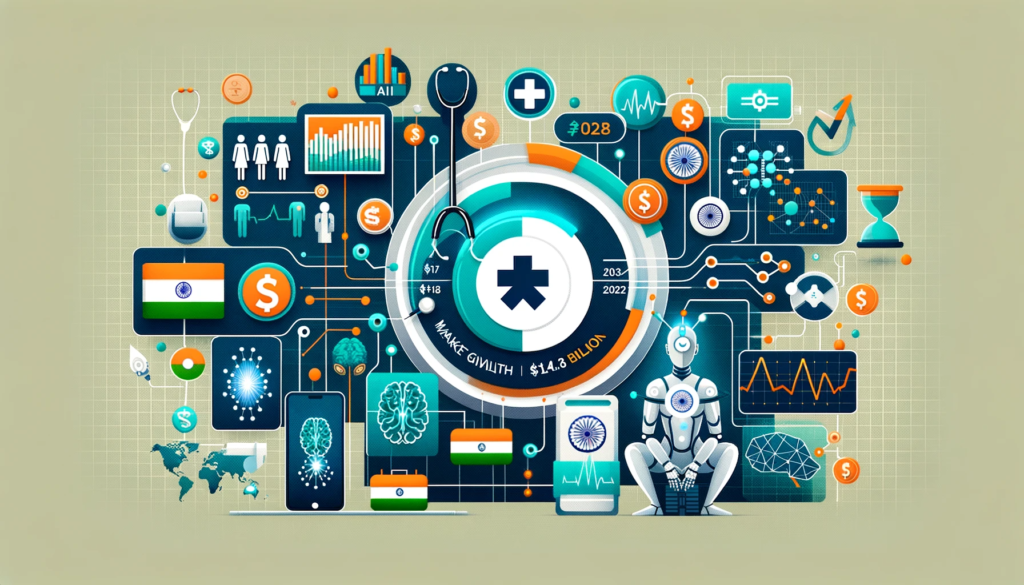
Growth and Economic Impact
The landscape of Indian healthcare is being reshaped by the formidable growth of AI and ML. The market value, which stood at $14.6 billion in 2023, is projected to skyrocket to $102.7 billion by 2028. This staggering increase is not just a testament to technological advancement but also a significant contributor to India’s economy. The integration of AI in healthcare promises to add approximately 25 billion dollars to India’s GDP by 2025, signifying a major economic transformation spearheaded by digital innovation in healthcare.
AI in Action: Diverse Applications
The applications of AI in the Indian healthcare sector are as diverse as they are impactful. AI’s role extends from enhancing patient diagnostics with remarkable precision to revolutionizing treatment methodologies. This includes sophisticated patient treatment techniques, innovations in medical imaging, diagnostics, and even the management of surgical robots. AI’s capability in automating routine tasks is freeing up valuable time for healthcare professionals, allowing them to focus more on critical patient care. Furthermore, AI-powered remote patient monitoring systems are bringing forth a new age of proactive and personalized healthcare, marking a shift from traditional reactive models to more predictive and preventive approaches.
Success Stories: Indian Startups Leading the Way
Indian startups are at the forefront of incorporating AI and ML in healthcare, bringing innovative solutions to complex health challenges. In this section, we highlight some of the most notable startups and their contributions to the field.
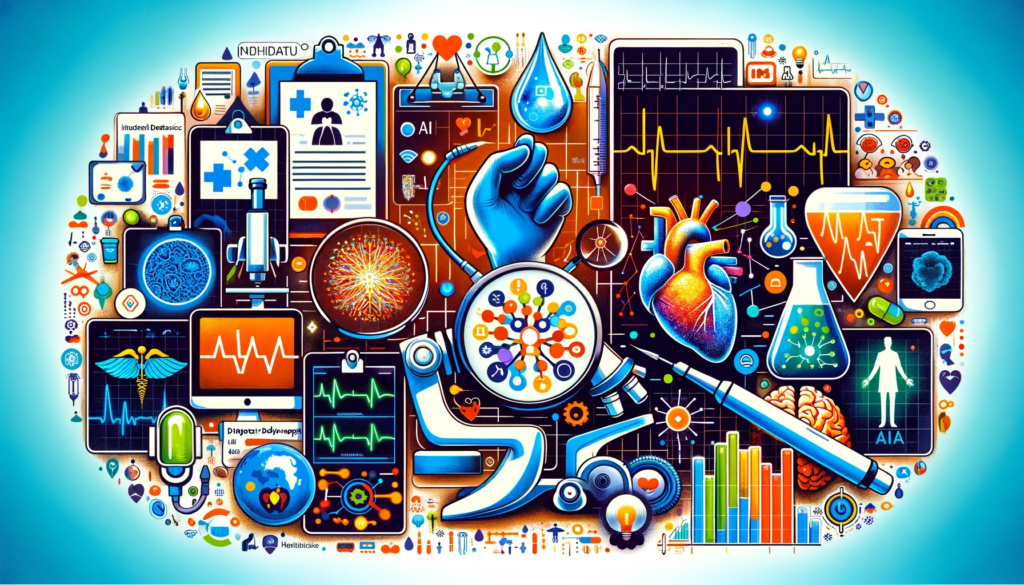
Innovative Startups at the Forefront
The burgeoning field of AI in healthcare in India is richly populated by innovative startups, each carving a niche with their groundbreaking applications. These startups are not just contributing to healthcare but are also shaping the future of AI in the domain.
- OncoStem Diagnostics: Pioneering in the realm of cancer care, OncoStem Diagnostics is revolutionizing how we approach cancer treatment. Utilizing ML algorithms, they assess the aggressiveness of tumors and predict recurrence risks, enabling more personalized and effective treatment plans for patients.
- Artelus: Specializing in the fight against diabetic retinopathy, Bengaluru-based Artelus leverages deep learning technology for early detection and diagnosis. Their AI-powered algorithms are instrumental in screening and have aided in the examination of thousands of patients, marking a significant step forward in preventive care.
- Tricog: Tricog stands out in the realm of cardiac care. By applying AI in cardiac diagnostics, products like InstaECG and InstaEcho are not only quick but also accurate, making a considerable impact on patient outcomes. Their work is a testament to how AI can enhance the speed and precision of healthcare delivery.
These startups exemplify the innovative spirit of India’s healthcare sector, showcasing how AI and ML can be harnessed to tackle some of the most pressing health challenges. Their work is not just a series of business ventures; it’s a movement towards a healthier, more informed, and technologically advanced healthcare future.
Navigating Challenges: Privacy, Ethics, and Accessibility
While AI in healthcare brings numerous benefits, it also presents significant challenges and ethical considerations. This section delves into the hurdles faced in privacy, data security, algorithmic bias, and accessibility.
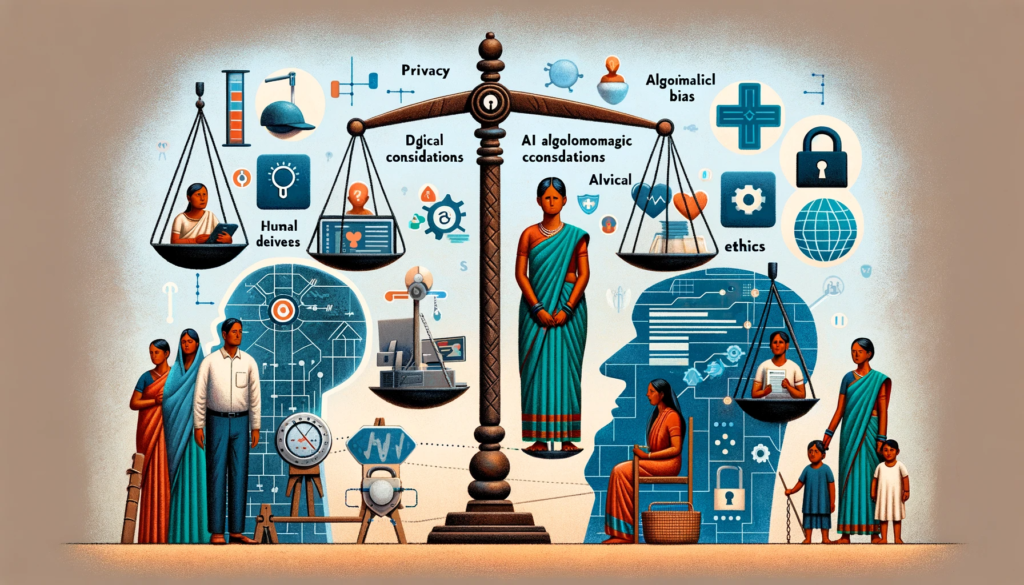
Balancing Innovation with Responsibility
The integration of AI in healthcare, while promising, brings with it a spectrum of challenges and ethical considerations that need to be meticulously navigated.
- Privacy and Data Security: With AI’s reliance on vast amounts of patient data, ensuring privacy and security is paramount. The risk of data breaches and unauthorized access poses significant concerns, necessitating stringent data protection measures and regulatory oversight.
- Algorithmic Bias and Fairness: The potential for bias in AI algorithms is a critical ethical concern. Biases in data sets can lead to skewed results, disproportionately impacting certain patient groups. Ensuring fairness and unbiased decision-making in AI systems is crucial for equitable healthcare delivery.
- The Digital Divide: Despite technological advancements, the digital divide remains a stark reality. In parts of rural India, limited internet connectivity and a lack of digital literacy can hinder access to AI-driven healthcare solutions. Bridging this gap is essential for ensuring that the benefits of AI in healthcare are available to all sections of society.
- Affordability and Accessibility: The cost of AI-based healthcare solutions poses another challenge. Ensuring that these advanced technologies are affordable and accessible to the broader population, especially the financially weaker sections, is crucial for achieving inclusive healthcare.
- Ethical Use and Regulation: The ethical use of AI in healthcare calls for well-defined regulations and guidelines. Balancing the technological possibilities with ethical practices is essential to fostering trust and acceptance among both healthcare providers and patients.
Although these obstacles are considerable, they also offer chances for creativity and advancement. Addressing them effectively requires collaborative efforts among technologists, healthcare professionals, policymakers, and patients.
The Indispensable Role of Healthcare Professionals
Even in a healthcare setting influenced by AI, the importance of medical professionals continues to be essential. This section discusses how human expertise and compassion continue to be essential in the era of AI.
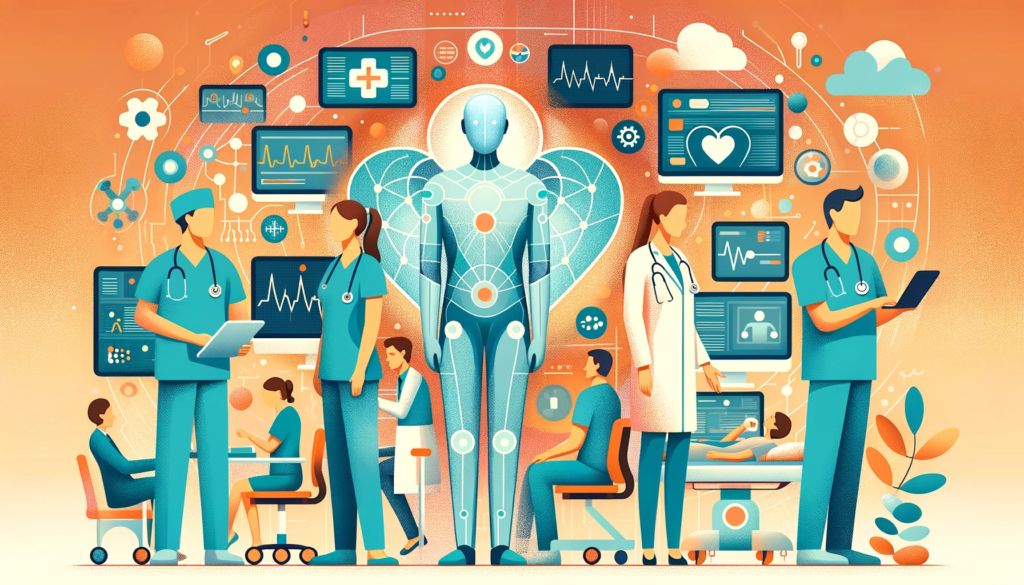
Human Touch in an AI-Dominated World
The advent of AI in healthcare has not diminished, but rather highlighted, the irreplaceable role of healthcare professionals. Their expertise, intuition, and compassion remain at the heart of healthcare delivery.
- Beyond Data and Algorithms: While AI systems excel at processing vast amounts of data and identifying patterns, they cannot replicate the nuanced understanding and empathetic care that healthcare professionals provide. The human element in healthcare is crucial, particularly in understanding and addressing the diverse and complex needs of patients.
- Collaborative Approach: The most effective use of AI in healthcare comes from a collaborative approach where technology and human expertise work in tandem. AI can enhance the capabilities of healthcare professionals, enabling them to provide more informed and efficient care.
- Adapting to New Roles: As AI technologies evolve, so too must the roles and skills of healthcare professionals. Continuous learning and adaptation are necessary to effectively integrate AI into their practice, ensuring they remain indispensable in an increasingly digital healthcare environment.
- Ethical Decision-Making: Healthcare professionals play a vital role in guiding the ethical application of AI in healthcare. Their insights and experiences are crucial in shaping policies and practices that govern the use of AI, ensuring that patient welfare remains the foremost priority.
The integration of AI in healthcare presents a unique opportunity for healthcare professionals to enhance their skills, improve patient outcomes, and lead the charge in navigating the ethical and practical challenges posed by these technologies.
The Future of AI and Machine Learning in Indian Healthcare: A Vision of Revolutionary Care
As we look to the future, AI and ML hold the promise of further transforming Indian healthcare. This concluding section envisions the potential advancements and the ongoing evolution of these technologies in healthcare.
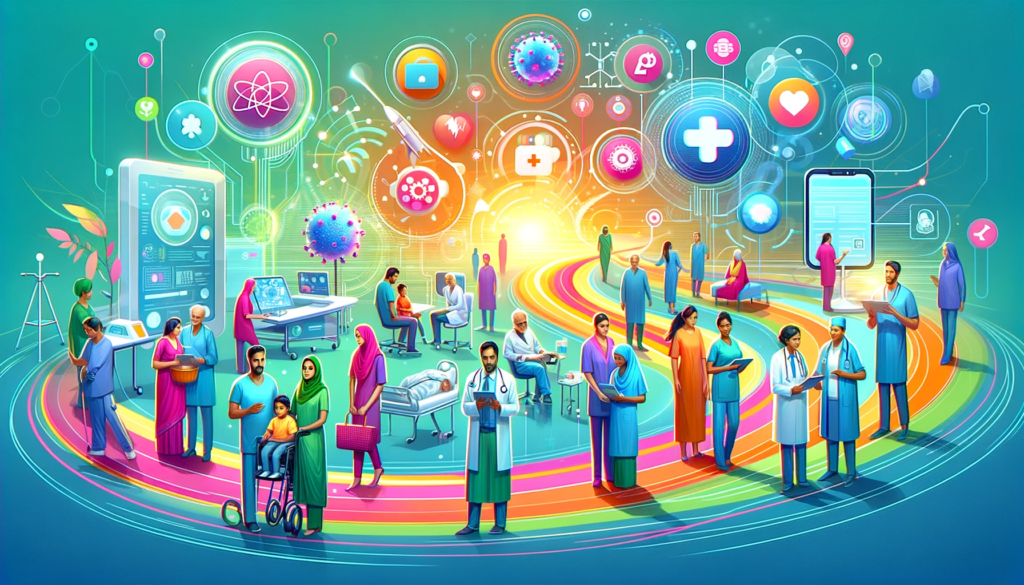
Embracing a Technologically Advanced Future
The trajectory of AI and Machine Learning in Indian healthcare points towards a future brimming with possibilities and innovations. The continual evolution of these technologies promises to not only enhance healthcare delivery but also to transform the very fabric of patient care and medical research.
- Predictive Healthcare: With AI and ML, the future of healthcare in India leans towards a more predictive model. The ability to analyze vast datasets can lead to early detection of diseases, personalized treatment plans, and better health outcomes.
- Enhanced Accessibility and Efficiency: The integration of AI is set to make healthcare more accessible, especially in remote and rural areas. AI-driven solutions can reduce the burden on healthcare facilities and practitioners, ensuring timely and efficient care for a broader population.
- Innovative Solutions to Health Challenges: AI and ML are paving the way for innovative solutions to some of the most pressing health challenges in India. From drug discovery to managing chronic diseases, these technologies are at the forefront of medical innovation.
- Empowering Patients and Providers: The future will see patients being more empowered in their healthcare journey, with AI providing personalized insights and recommendations. Healthcare providers, equipped with AI tools, will be able to offer more effective and informed care.
- Ethical and Regulated Development: As we advance, the ethical development and regulation of AI in healthcare will remain crucial. The focus will be on creating a balanced ecosystem where technological advancements go hand in hand with ethical practices and patient-centric care.
Conclusion
The integration of AI and Machine Learning in Indian healthcare is more than just a technological leap; it’s a step towards a future where healthcare is more accessible, personalized, and efficient. As we embrace this digital health revolution, it’s essential to continue fostering an environment that encourages innovation, prioritizes patient welfare, and navigates the ethical complexities with care and consideration.
Author’s Note
As the author of this exploration into the role of AI and Machine Learning in Indian healthcare, my objective has been to offer a comprehensive overview of how these groundbreaking technologies are reshaping the medical landscape. From the economic impact to the ethical considerations, this blog aims to provide a balanced perspective on the challenges and opportunities presented by AI and ML in healthcare. I hope that this post not only informs but also inspires our readers to engage with and appreciate the rapidly evolving field of digital healthcare.
G. C., Ecosociosphere contributor.
References
- “AI in Indian healthcare sector: Promises and challenges,” IndiaAI, Link
- “8 Indian Startups Advancing Healthcare With AI,” Analytics India Magazine, Link
- “How AI Is Transforming The Future of Healthcare In India,” IndiaAI, Link
These sources have been instrumental in providing the factual foundation for this blog post. Their insights into the latest trends and developments in AI and

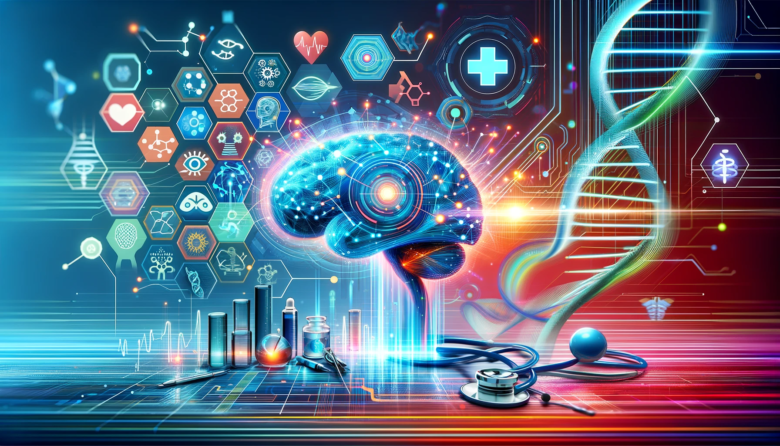



Comments
Thanks for sharing. I read many of your blog posts, cool, your blog is very good.
Can you be more specific about the content of your article? After reading it, I still have some doubts. Hope you can help me.
Your point of view caught my eye and was very interesting. Thanks. I have a question for you.
Can you be more specific about the content of your article? After reading it, I still have some doubts. Hope you can help me.
Your article helped me a lot, is there any more related content? Thanks!
I don’t think the title of your article matches the content lol. Just kidding, mainly because I had some doubts after reading the article.